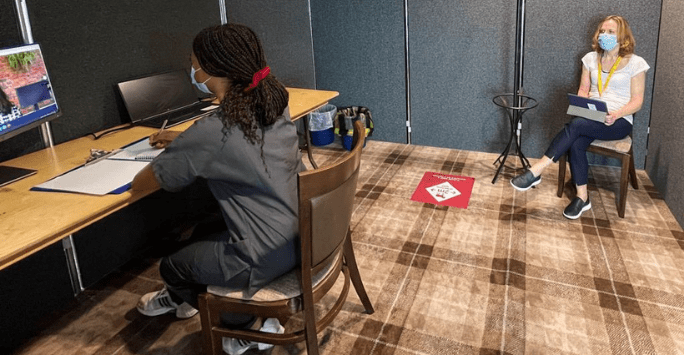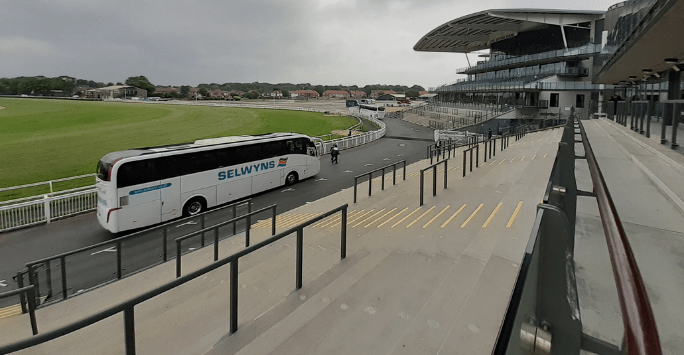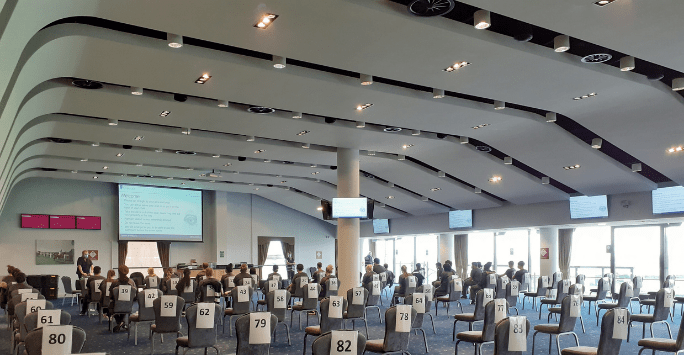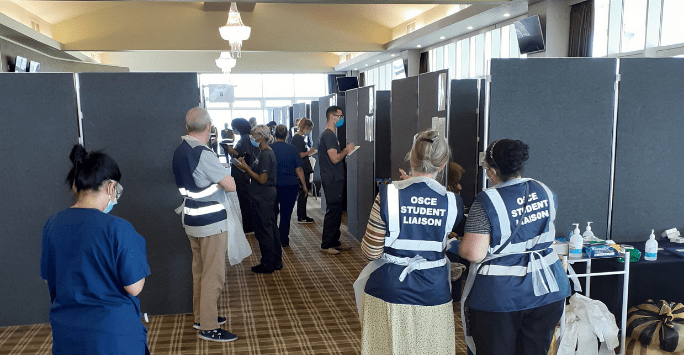
Liverpool School of Medicine descended on Aintree Racecourse again this March to run clinical assessments for 300 final-year student doctors as part of the new Year Five MBChB curriculum.
The School’s Clinical Skills and Assessment teams are dab hands at pulling off this type of assessment, which involves the management and coordination of an astounding number of clinical examiner, simulated patients, volunteers and of course students.
During the summer exam period, this is only amplified as assessments are run across multiple year groups and involve close to 2000 clinicians from trusts across the region, who volunteer their time to evaluate performance in the clinical scenarios.
This year, the School rolled out the March exams evaluating the clinical progress of year five students as they work towards qualification this August.
 Students arrive at Aintree for the assessments
Students arrive at Aintree for the assessments
Dr Natalie Harrington, Clinical Assessment Station Lead, says,
The clinical stations in the new Year Five assessment test a range of different clinical content combining communication, history taking, clinical reasoning, examination and procedural skills at a level ready to commence FY1 practice.
"Many different people are involved in developing these stations and we’d like to thank everyone who has helped the team in designing, writing, trialling, reviewing and checking the stations, as well as those who helped bring the stations to life in the exam.”
Creative teaching methods
Over the past two years, the Clinical Skills department has demonstrated seemingly endless amounts of creativity and agility to not only successfully deliver teaching, but also ensure student doctors were given the opportunity to demonstrate their skills in clinical assessments.
In practice, this meant creating a variety of new online learning methods and additional resources, and adjusting in-person teaching methods to make them COVID safe, once students were able to return to campus for small group teaching sessions.
Director of Clinical Skills, Simulation & OSCE Helen Box is enormously proud of how the department has risen to the many challenges the pandemic has presented.
“The team had to dramatically change their delivery style to protect student safety, yet continue to deliver the required learning outcomes and practical experience."
They rapidly redesigned teaching materials to create a suite of hybrid content to support a new flipped classroom model and complement the shorter practical sessions with smaller teaching groups.
This suite included new video tutorials, quizzes and additional interactive resources that ensured student doctors were receiving key clinical skills, in order to both progress their studies and prepare for clinical placements.
To make the online teaching sessions both immersive and practical, the team came up with creative ways of teaching clinical skills; from creating lumps using balloons filled with different household products, to having students demonstrate and practice abdominal palpation with pillows.
 Students are briefed ahead of the clinical scenarios
Students are briefed ahead of the clinical scenarios
Looking forward, the team is keen to incorporate everything they have learnt throughout the pandemic into their teaching delivery, including the flipped classroom model which has proven popular with students.
Clinical Skills teaching is consistently highlighted as one of the students’ most useful and enjoyable parts of the programme, with one final-year student describing the sessions as ‘some of my favourite memories from studying medicine’.
Adaptable assessment delivery
When clinical assessments were unable to take place at the height of the first national lockdown, alternatives were put in place to ensure year five students were able to sit these in November 2020, with a purpose-built setting created at Cedar House to run the majority of scenarios there in person, complemented by a small number of online sessions to reduce numbers on site.
Last summer, it was back to Aintree but not without alterations to the setup, including social distancing and the wearing of face coverings and PPE, to ensure safety. At the time, Clinical Skills Team Leader and Examiner Recruitment Lead, Hannah Crossman commended the team on their achievements,
"2021 was particularly challenging with a number of examiners and students having to isolate at the last minute. This meant we had to constantly re-evaluate and problem solve, with reserve trained examiners occasionally being drafted in at the last minute to save the day. We were delighted that as far as our assessment candidates were concerned, each and every assessment was executed without a hitch.”
 Student doctors take notes before the exam begins
Student doctors take notes before the exam begins
Fast forward to this March and Helen Box made sure to take a moment while she was down at Aintree to reflect on how far the department, and this particular group of student doctors had come.
“It was exciting to be out at Aintree running the first ever Year 5 clinical assessment."
We could see the mist rising from the race course and the famous Grand National stadium around us whilst our final-year students undertook their last clinical exams with us.
"The assessment had been in the planning phase for several years with a final twelve months of intense design, development and trailing. It was great to see it come to fruition!”
Discover more
- If you are a clinician and would like to take part in the next round of assessments as an examiner, sign up and learn more on our OSCE examiner portal (link).
- Learn more about other opportunities to volunteer with the School of Medicine on our Liverpool Educators Online web area (link).